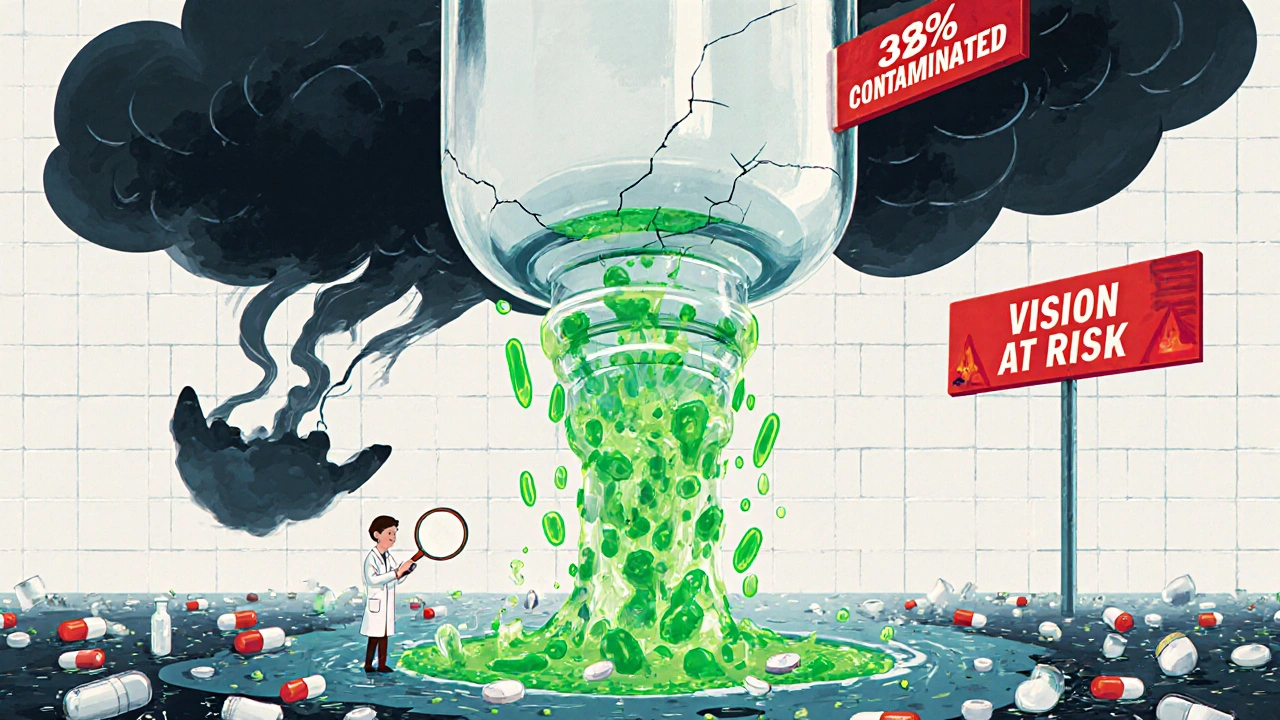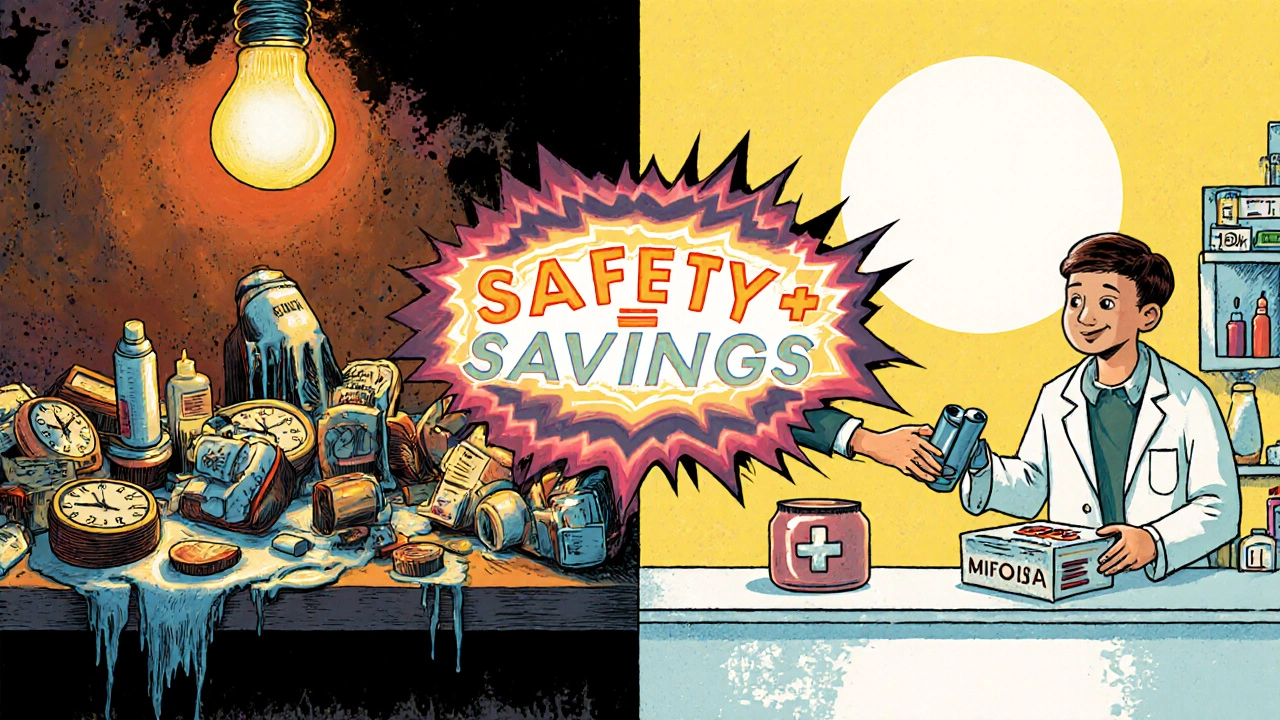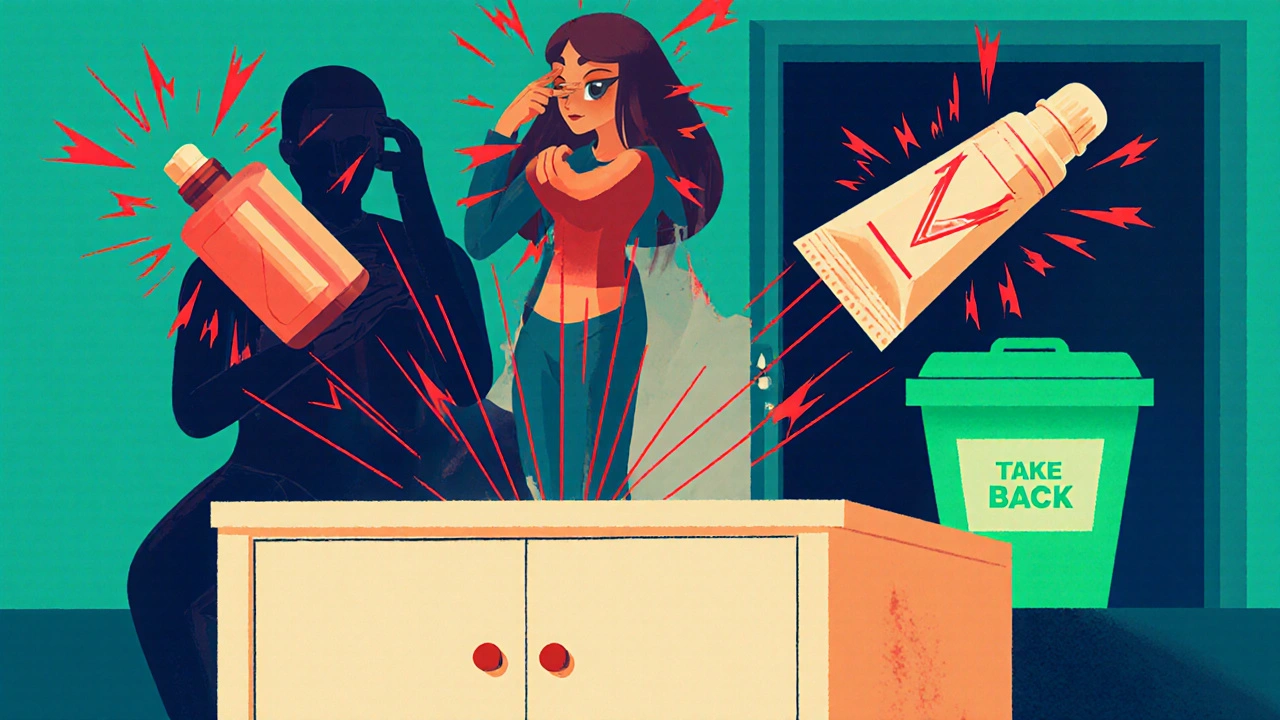Most people don’t think twice about keeping an old inhaler, eye drop bottle, or cream in their medicine cabinet-until they need it. And that’s when the real danger shows up. An expired inhaler might not deliver enough medicine during an asthma attack. Expired eye drops could harbor bacteria that cause infections. Old topical creams may stop working entirely, leaving rashes or eczema untreated. The problem isn’t just ineffectiveness-it’s risk. According to the FDA, about 80% of Americans have used medications past their expiration date. But using expired respiratory, eye, or skin medications isn’t a harmless shortcut. It’s a gamble with your health.
Why Expiration Dates Matter More Than You Think
Expiration dates aren’t arbitrary. They’re based on rigorous testing by manufacturers to ensure the drug stays potent and safe under normal storage conditions. The FDA required these dates back in 1979, and they’re not suggestions-they’re guarantees. For most pills and liquids, that window is 12 to 24 months after production. But for inhalers, eye drops, and creams, the clock ticks faster.Take albuterol inhalers like Ventolin or ProAir. Once you remove them from the foil pouch, they start losing effectiveness. ProAir RespiClick, for example, is only guaranteed to work for 13 months after opening. After that, the dose you get isn’t consistent. One puff might deliver 90% of the dose. The next, only 40%. That kind of variation is dangerous during an asthma emergency. A 2021 study in the Chest Journal found expired inhalers delivered only 60-70% of the needed medication. In a severe attack, that gap could mean the difference between breathing and needing an ambulance.
Eye drops are even more fragile. A 2022 study in Clinical Ophthalmology found that 38% of artificial tear bottles showed microbial growth just seven days after expiration. That’s not a typo. Nearly four in ten bottles became breeding grounds for bacteria. Using them can lead to corneal ulcers, infections, and even vision loss. The American Academy of Ophthalmology reports that 42% of expired eye drop samples tested positive for contamination after 30 days. Fresh drops? Only 8% had contamination. The difference isn’t subtle-it’s life-changing.
Topical medications like hydrocortisone cream behave differently. They don’t turn toxic, but they lose strength. At room temperature, hydrocortisone retains 90% potency for six months past expiration. But if it’s stored in a hot bathroom or a sunlit drawer, potency drops to 65% within the same time. That means your rash might not respond. You keep applying more, thinking it’s not working-when really, the medicine just degraded.
What Happens When You Use Expired Medications
Some people swear they’ve used an expired inhaler and got relief. Maybe they did. But that’s not safety-it’s luck. The American College of Allergy, Asthma, and Immunology says expired respiratory meds contribute to 12% of avoidable asthma ER visits each year. Why? Because the dose is unreliable. One puff might work. The next might do nothing. There’s no way to tell.
Dr. Robert Citard, a pharmacy professor at Purdue University, put it bluntly in a 2023 webinar: “Expired albuterol inhalers can vary by up to 35% in dose delivery. That’s not a small error. That’s life-threatening unpredictability.”
There’s also the psychological trap. You think, “It’s only been three months past the date. It should be fine.” But stability testing doesn’t work that way. Medications degrade at different rates depending on heat, light, and humidity. A bottle of eye drops sitting on your bathroom counter isn’t being stored like it was in a lab. The same goes for inhalers in a car glovebox or creams in a drawer above the stove.
And then there’s the case reports. In 2023, a 24-year-old patient ended up hospitalized after an asthma attack didn’t respond to an expired inhaler. He thought he was covered. He wasn’t.
On the flip side, some users report mild relief from inhalers used within three months of expiration. But experts warn: that’s false security. If your symptoms are getting worse, you can’t risk guessing whether your inhaler still works. In an emergency, there’s no time to test it.

How to Properly Dispose of Expired Medications
Throwing expired meds in the trash or flushing them down the toilet isn’t just wrong-it’s harmful. The U.S. Geological Survey found medication residues in 80% of U.S. waterways. That’s not just pollution. It’s an ecological crisis.
The FDA’s preferred method? Drug take-back programs. There are over 11,000 registered collection sites across the country, run by the DEA’s National Prescription Drug Take Back Day. CVS and Walgreens offer free drop-off bins at thousands of locations. You don’t need a receipt. You don’t need to be the original patient. Just bring the expired meds-no questions asked.
But inhalers are different. They’re pressurized. They contain propellants like hydrofluoroalkanes, which are classified as hazardous waste. If you toss them in the trash, they can explode in compactors or incinerators. The Washington State Department of Health recommends using free prepaid mailers designed specifically for inhalers. Over 70% of U.S. states now offer these. Amazon Pharmacy started offering free mail-back disposal for expired inhalers in October 2023-and processed 12,000 units in just three months.
If no take-back option is available, here’s the safe at-home method:
- Remove the medication from the device. For inhalers, detach the mouthpiece. For eye drops, pour out the liquid.
- Mix the contents with something unappealing-used coffee grounds, kitty litter, or dirt.
- Place the mixture in a sealed container or bag.
- Throw it in the household trash.
Never flush unless the label says to. Most medications shouldn’t go down the drain. And never crush pills or burn them at home. That releases toxic fumes.
Special Rules for Different Medication Types
Not all expired meds are the same. Here’s how to handle each type:
Inhalers
MDIs (metered-dose inhalers) like Ventolin, ProAir, and Combivent have propellant systems that degrade after expiration. Even if you can still spray it, the dose is likely inconsistent. Dry powder inhalers like Advair Diskus lose potency faster in humid environments. If you live in a humid climate, store them in a cool, dry place-even before they expire. Once expired, treat them as hazardous waste. Use a mail-back kit or drop them off at a pharmacy with a take-back program.
Eye Drops
These are the most dangerous to keep past expiration. No exceptions. Even if the bottle looks clean and the liquid looks clear, bacteria can grow invisibly. The American Academy of Ophthalmology says: “When in doubt, throw it out.” Never reuse eye drops beyond the printed date. Don’t try to extend life by cleaning the tip. You’re not sterilizing-you’re spreading contamination.
Topical Medications
Creams, ointments, and gels are less risky than inhalers or drops, but they still degrade. Check for changes in color, smell, or texture. If it smells weird, looks separated, or feels gritty, toss it. Even if it looks fine, potency drops over time. Hydrocortisone loses effectiveness faster in heat. Store creams in a cool, dark place-not the bathroom. If you’re unsure, consult a pharmacist. They can tell you if it’s still safe to use.

What to Do If You Can’t Afford New Medications
Let’s be real. Many people keep expired meds because they can’t afford replacements. The Asthma and Allergy Foundation of America found that 41% of low-income asthma patients use expired inhalers because of cost. ProAir HFA was discontinued in 2022, and prices for alternatives jumped. Medicaid patients were hit hardest.
But you don’t have to choose between safety and affordability. Here’s what to do:
- Ask your doctor for samples or patient assistance programs. Many drugmakers offer free or low-cost meds to qualifying patients.
- Check with community health centers. In 2023, over 1,200 centers partnered with the Asthma and Allergy Foundation to provide free inhaler disposal kits and replacement vouchers.
- Use pharmacy discount programs. CVS, Walgreens, and Walmart offer generic albuterol inhalers for as low as $10 without insurance.
- Call the Medicine Safe Disposal Hotline at 1-800-222-1222. They can connect you to local resources for free or low-cost medications.
There’s no excuse for risking your health because of cost. Help is available. Use it.
What’s Changing in Medication Disposal
The system is slowly improving. The 2022 Inflation Reduction Act gave $5 million to expand medication disposal programs. By early 2024, 47 states had launched new initiatives. Smart packaging is coming too. Propeller Health’s new inhaler cap, released in Q2 2023, tracks usage and alerts you 30 days before expiration. It even gives disposal instructions via an app.
By 2027, the Healthcare Environmental Resource Center predicts 90% of major pharmacies will offer full disposal services. But right now, only 31% of Americans use take-back programs. The rest? They still toss meds in the trash. That’s changing-but not fast enough.
What you do today matters. Proper disposal protects your family, your community, and the environment. It’s not just about safety-it’s about responsibility.
Can I still use an expired inhaler if it looks fine?
No. Even if the inhaler looks and sounds normal, the dose may be inconsistent or too weak. During an asthma attack, you need the full dose immediately. Relying on an expired inhaler could delay treatment and lead to hospitalization. The FDA and major medical associations agree: if it’s expired, replace it.
Are eye drops safe to use after the expiration date if they’ve never been opened?
No. Even unopened eye drops can degrade over time, and the preservatives that keep them sterile lose effectiveness. Microbial contamination can occur even in sealed bottles. The risk of eye infection is too high. Always discard eye drops after the printed expiration date, regardless of whether they’ve been opened.
How do I dispose of expired hydrocortisone cream?
Mix the cream with used coffee grounds or kitty litter in a sealed bag, then throw it in the trash. Do not pour it down the drain or flush it. If your pharmacy offers a take-back program, you can also drop off the tube there. Always remove the cap and label before disposal.
Why can’t I just flush expired medications?
Flushing medications pollutes waterways. The U.S. Geological Survey found drug residues in 80% of U.S. water samples. These chemicals harm aquatic life and can enter drinking water supplies. Only flush medications if the label or FDA website specifically says to. For most drugs, including inhalers, drops, and creams, this is not safe or recommended.
Where can I find a medication disposal site near me?
Visit the DEA’s National Prescription Drug Take Back Day website or call the Medicine Safe Disposal Hotline at 1-800-222-1222. Major pharmacies like CVS and Walgreens also have drop-off bins in most locations. You can also check with your local police station or hospital-they often host collection events.
If you’ve been holding onto expired meds out of habit, convenience, or cost, it’s time to change. Your health isn’t worth the risk. Your community isn’t worth the pollution. And your future self will thank you for doing it right.


Gary Hattis
November 13, 2025 AT 04:44I used an expired Ventolin last winter during a nasty cold. Thought I was fine-until I ended up in the ER. Turns out the inhaler was delivering maybe 30% of the dose. My lungs felt like they were full of sand. Don’t be that guy. Just replace it. Your future self will high-five you.
Deepa Lakshminarasimhan
November 13, 2025 AT 11:11They say expiration dates are for your safety… but what if they’re just a profit scheme? I’ve seen bottles sit in warehouses for years, then get shipped out with new labels. The FDA doesn’t test every batch. Big Pharma just wants you to buy more. I keep mine. I’m not scared.
Erica Cruz
November 14, 2025 AT 20:57Wow. This post is basically a 2,000-word ad for CVS and Walgreens. Let’s be real-most people don’t have time or money for ‘take-back programs.’ You think a single mom working two jobs is going to drive 15 miles to drop off an inhaler? The real issue isn’t expiration dates-it’s healthcare inequality. And you’re all just virtue signaling with your perfectly labeled disposal bins.
Johnson Abraham
November 15, 2025 AT 18:02lol who cares if the inhaler is expired? i’ve been using mine since 2021 and i’m still breathing 😎 also why are we paying $400 for a tiny plastic tube? capitalism is rigged. #pharmabullshit
Shante Ajadeen
November 15, 2025 AT 23:51Thank you for writing this. I’ve been scared to throw out my grandma’s old hydrocortisone because she used it for years. Now I know it’s safer to toss it. I’m going to drop off my expired eye drops this weekend. Small step, but it feels right.
dace yates
November 17, 2025 AT 03:02How do you know the 60-70% effectiveness stat for expired inhalers isn’t from poorly stored ones? Like, if someone keeps theirs in a hot car for a year, of course it’s degraded. But what if it’s been in a cool, dark drawer? Is there any data on that?
Danae Miley
November 17, 2025 AT 04:38There’s a significant flaw in your argument. The 2021 Chest Journal study you cite used inhalers stored at 35°C and 75% humidity-conditions that violate FDA storage guidelines. Real-world degradation varies wildly based on environment. You’re conflating misuse with inherent instability. That’s misleading.
Charles Lewis
November 17, 2025 AT 06:55Let me offer some perspective. As someone who’s worked in public health for over two decades, I’ve seen the consequences of misinformation-and also the consequences of fearmongering. Yes, expired medications carry risk. But blanket statements like ‘never use them’ ignore the reality for millions without access to affordable care. The real solution isn’t just disposal-it’s systemic reform. We need universal access to basic medications, not just better trash bins. Until then, we must balance risk with compassion. Let’s not shame people for survival tactics-we must fix the system that forces them into those choices.
Renee Ruth
November 18, 2025 AT 21:26So let me get this straight-you’re telling me I can’t use my 2-month-expired eye drops, but Big Pharma is selling me new ones for $80? And if I don’t, I’m risking blindness? Meanwhile, the CEO of that company just bought a private island. I’m not afraid of the medicine-I’m afraid of the people who profit from my fear.